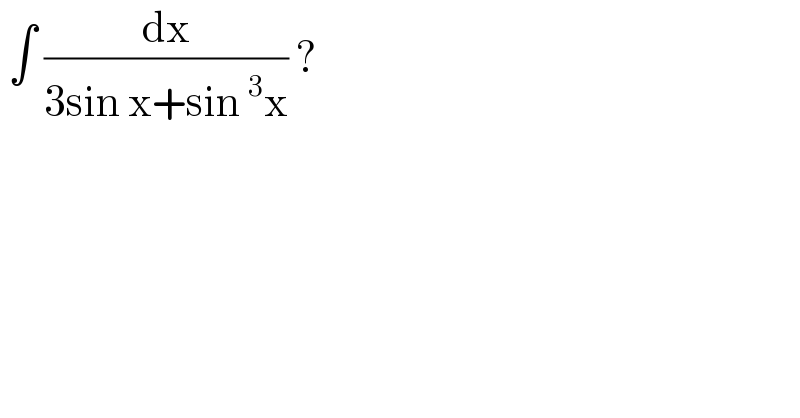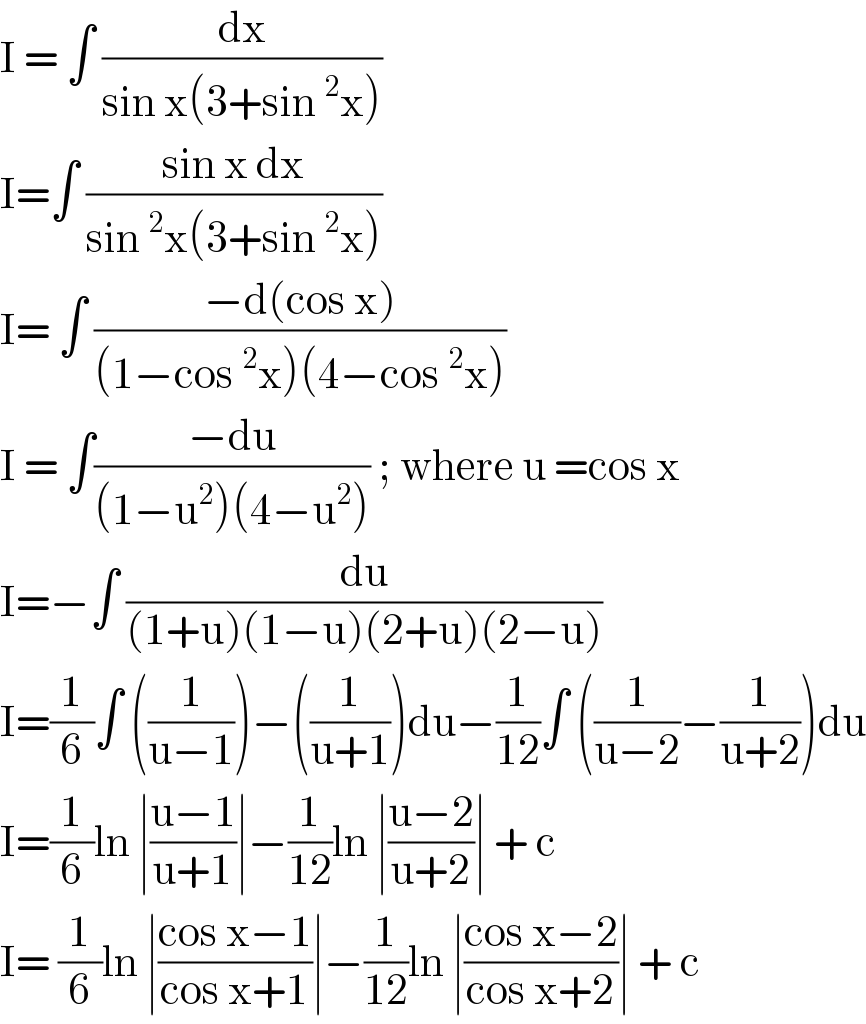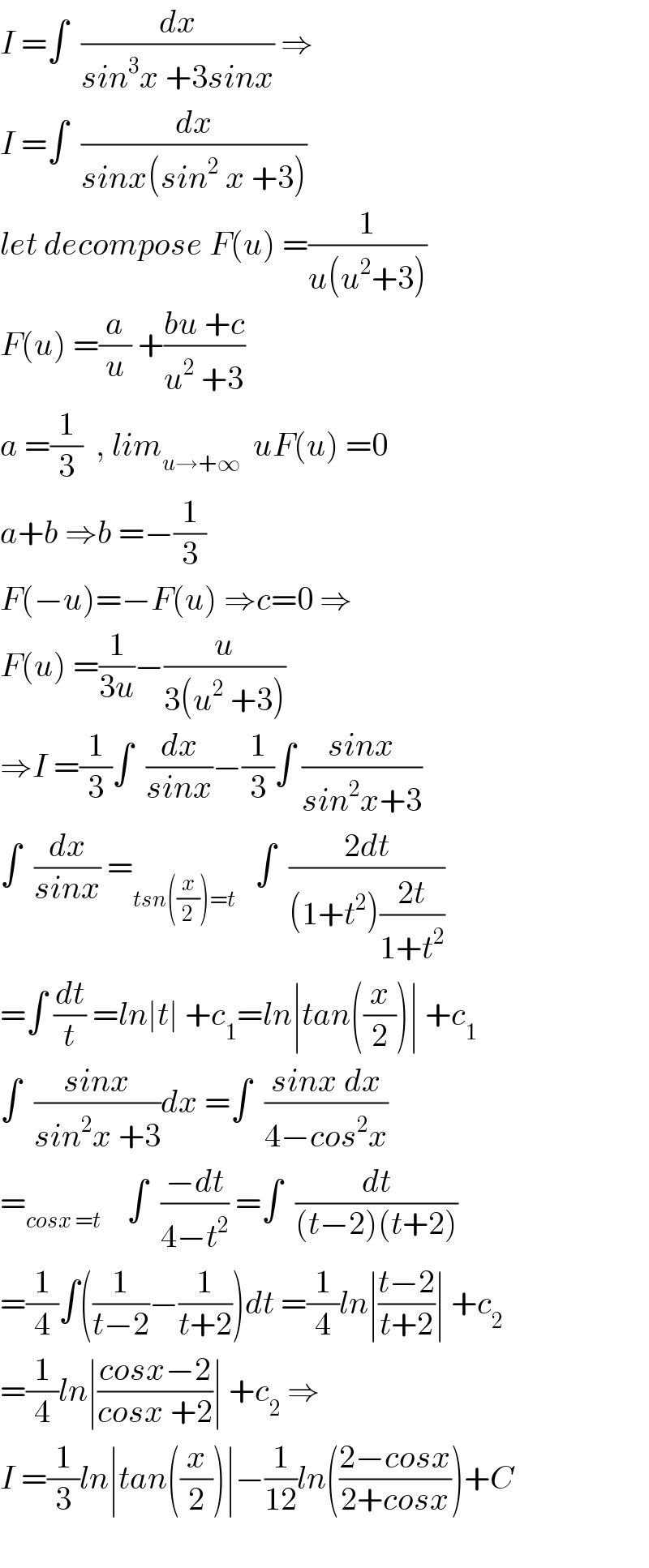Question Number 113275 by bemath last updated on 12/Sep/20

$$\:\int\:\frac{\mathrm{dx}}{\mathrm{3sin}\:\mathrm{x}+\mathrm{sin}\:^{\mathrm{3}} \mathrm{x}}\:? \\ $$
Answered by bemath last updated on 12/Sep/20

$$\mathrm{I}\:=\:\int\:\frac{\mathrm{dx}}{\mathrm{sin}\:\mathrm{x}\left(\mathrm{3}+\mathrm{sin}\:^{\mathrm{2}} \mathrm{x}\right)} \\ $$$$\mathrm{I}=\int\:\frac{\mathrm{sin}\:\mathrm{x}\:\mathrm{dx}}{\mathrm{sin}\:^{\mathrm{2}} \mathrm{x}\left(\mathrm{3}+\mathrm{sin}\:^{\mathrm{2}} \mathrm{x}\right)} \\ $$$$\mathrm{I}=\:\int\:\frac{−\mathrm{d}\left(\mathrm{cos}\:\mathrm{x}\right)}{\left(\mathrm{1}−\mathrm{cos}\:^{\mathrm{2}} \mathrm{x}\right)\left(\mathrm{4}−\mathrm{cos}\:^{\mathrm{2}} \mathrm{x}\right)} \\ $$$$\mathrm{I}\:=\:\int\frac{−\mathrm{du}}{\left(\mathrm{1}−\mathrm{u}^{\mathrm{2}} \right)\left(\mathrm{4}−\mathrm{u}^{\mathrm{2}} \right)}\:;\:\mathrm{where}\:\mathrm{u}\:=\mathrm{cos}\:\mathrm{x} \\ $$$$\mathrm{I}=−\int\:\frac{\mathrm{du}}{\left(\mathrm{1}+\mathrm{u}\right)\left(\mathrm{1}−\mathrm{u}\right)\left(\mathrm{2}+\mathrm{u}\right)\left(\mathrm{2}−\mathrm{u}\right)} \\ $$$$\mathrm{I}=\frac{\mathrm{1}}{\mathrm{6}}\int\:\left(\frac{\mathrm{1}}{\mathrm{u}−\mathrm{1}}\right)−\left(\frac{\mathrm{1}}{\mathrm{u}+\mathrm{1}}\right)\mathrm{du}−\frac{\mathrm{1}}{\mathrm{12}}\int\:\left(\frac{\mathrm{1}}{\mathrm{u}−\mathrm{2}}−\frac{\mathrm{1}}{\mathrm{u}+\mathrm{2}}\right)\mathrm{du} \\ $$$$\mathrm{I}=\frac{\mathrm{1}}{\mathrm{6}}\mathrm{ln}\:\mid\frac{\mathrm{u}−\mathrm{1}}{\mathrm{u}+\mathrm{1}}\mid−\frac{\mathrm{1}}{\mathrm{12}}\mathrm{ln}\:\mid\frac{\mathrm{u}−\mathrm{2}}{\mathrm{u}+\mathrm{2}}\mid\:+\:\mathrm{c} \\ $$$$\mathrm{I}=\:\frac{\mathrm{1}}{\mathrm{6}}\mathrm{ln}\:\mid\frac{\mathrm{cos}\:\mathrm{x}−\mathrm{1}}{\mathrm{cos}\:\mathrm{x}+\mathrm{1}}\mid−\frac{\mathrm{1}}{\mathrm{12}}\mathrm{ln}\:\mid\frac{\mathrm{cos}\:\mathrm{x}−\mathrm{2}}{\mathrm{cos}\:\mathrm{x}+\mathrm{2}}\mid\:+\:\mathrm{c} \\ $$
Answered by abdomsup last updated on 12/Sep/20

$${I}\:=\int\:\:\frac{{dx}}{{sin}^{\mathrm{3}} {x}\:+\mathrm{3}{sinx}}\:\Rightarrow \\ $$$${I}\:=\int\:\:\frac{{dx}}{{sinx}\left({sin}^{\mathrm{2}} \:{x}\:+\mathrm{3}\right)} \\ $$$${let}\:{decompose}\:{F}\left({u}\right)\:=\frac{\mathrm{1}}{{u}\left({u}^{\mathrm{2}} +\mathrm{3}\right)} \\ $$$${F}\left({u}\right)\:=\frac{{a}}{{u}}\:+\frac{{bu}\:+{c}}{{u}^{\mathrm{2}} \:+\mathrm{3}} \\ $$$${a}\:=\frac{\mathrm{1}}{\mathrm{3}}\:\:,\:{lim}_{{u}\rightarrow+\infty} \:\:{uF}\left({u}\right)\:=\mathrm{0} \\ $$$${a}+{b}\:\Rightarrow{b}\:=−\frac{\mathrm{1}}{\mathrm{3}} \\ $$$${F}\left(−{u}\right)=−{F}\left({u}\right)\:\Rightarrow{c}=\mathrm{0}\:\Rightarrow \\ $$$${F}\left({u}\right)\:=\frac{\mathrm{1}}{\mathrm{3}{u}}−\frac{{u}}{\mathrm{3}\left({u}^{\mathrm{2}} \:+\mathrm{3}\right)} \\ $$$$\Rightarrow{I}\:=\frac{\mathrm{1}}{\mathrm{3}}\int\:\:\frac{{dx}}{{sinx}}−\frac{\mathrm{1}}{\mathrm{3}}\int\:\frac{{sinx}}{{sin}^{\mathrm{2}} {x}+\mathrm{3}} \\ $$$$\int\:\:\frac{{dx}}{{sinx}}\:=_{{tsn}\left(\frac{{x}}{\mathrm{2}}\right)={t}} \:\:\:\int\:\:\frac{\mathrm{2}{dt}}{\left(\mathrm{1}+{t}^{\mathrm{2}} \right)\frac{\mathrm{2}{t}}{\mathrm{1}+{t}^{\mathrm{2}} }} \\ $$$$=\int\:\frac{{dt}}{{t}}\:={ln}\mid{t}\mid\:+{c}_{\mathrm{1}} ={ln}\mid{tan}\left(\frac{{x}}{\mathrm{2}}\right)\mid\:+{c}_{\mathrm{1}} \\ $$$$\int\:\:\frac{{sinx}}{{sin}^{\mathrm{2}} {x}\:+\mathrm{3}}{dx}\:=\int\:\:\frac{{sinx}\:{dx}}{\mathrm{4}−{cos}^{\mathrm{2}} {x}} \\ $$$$=_{{cosx}\:={t}} \:\:\:\:\int\:\:\frac{−{dt}}{\mathrm{4}−{t}^{\mathrm{2}} }\:=\int\:\:\frac{{dt}}{\left({t}−\mathrm{2}\right)\left({t}+\mathrm{2}\right)} \\ $$$$=\frac{\mathrm{1}}{\mathrm{4}}\int\left(\frac{\mathrm{1}}{{t}−\mathrm{2}}−\frac{\mathrm{1}}{{t}+\mathrm{2}}\right){dt}\:=\frac{\mathrm{1}}{\mathrm{4}}{ln}\mid\frac{{t}−\mathrm{2}}{{t}+\mathrm{2}}\mid\:+{c}_{\mathrm{2}} \\ $$$$=\frac{\mathrm{1}}{\mathrm{4}}{ln}\mid\frac{{cosx}−\mathrm{2}}{{cosx}\:+\mathrm{2}}\mid\:+{c}_{\mathrm{2}} \:\Rightarrow \\ $$$${I}\:=\frac{\mathrm{1}}{\mathrm{3}}{ln}\mid{tan}\left(\frac{{x}}{\mathrm{2}}\right)\mid−\frac{\mathrm{1}}{\mathrm{12}}{ln}\left(\frac{\mathrm{2}−{cosx}}{\mathrm{2}+{cosx}}\right)+{C} \\ $$$$ \\ $$
